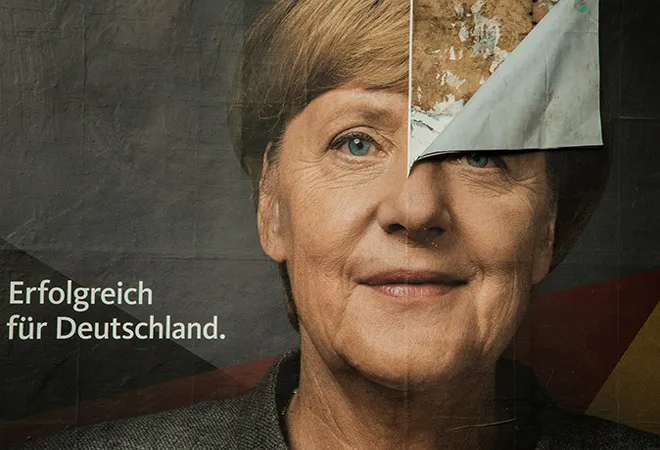
Just two months ago, Germany seemed like an island of stability in an otherwise crisis-ridden Europe. Angela Merkel was all set to win her fourth term in office in a rather boring electoral campaign. But German voters decided otherwise. Heavy losses for Merkel’s governing coalition and the ascent of the right-wing populist party AfD made it impossible to continue the “grand coalition” of Merkel’s Christian Democrats with the Social Democrats (SPD).
While the SPD decided to spend the next four years in opposition to recover from the worst election result in their history, Merkel entered into coalition talks with the Green Party, the Liberals (FDP), and the CDU’s Bavarian sister party CSU. On Monday, these talks, too failed. In the end, the Liberals pulled the plug for the so called black, green and yellow “Jamaica coalition” citing unsurmountable differences. “It’s better not to govern at all than to govern badly,” said party head Christian Lindner.
Heavy losses for Merkel’s governing coalition and the ascent of the right-wing populist party AfD made it impossible to continue the grand coalition of Merkel’s Christian Democrats with the Social Democrats (SPD).
For Germany and Europe, this means a prolonged period of insecurity in which there will be no functioning government in the most powerful country of the EU. It also means that French President Emanuel Macron, who was elected in April with a broad reform agenda for his nation and the European Union will have no partner to push forward with for some time. Europe therefore, will remain without much voice and influence in a quickly changing world order for the next half year, or longer.
There are only two possible ways out of the current stalemate in Germany. Either the SPD agrees to enter again into a new edition of the “grand coalition,” which is rather unlikely or there must be new elections. But that is easier said than done. According to the German constitution, it is the president (currently: Social Democrat Frank-Walter Steinmeier) who has to nominate a chancellor for approval by the parliament, the Bundestag. If no stable government can be formed after three rounds of voting there, the president can then call for fresh elections.
Angela Merkel, who has been weakened again by her failure to cobble together a new government, has already signaled that she would prefer a new start. And that is most likely what German voters prefer. There has never been much enthusiasm for a “Jamaica” government among the electorate, and probably rightly so.
Angela Merkel, who has been weakened again by her failure to cobble together a new government, has already signaled that she would prefer a new start.
In retrospect, it is no surprise that it was the 38-years old Lindner who spoilt the party. Lindner argued that his prospective partners were all set for a kind of continuation of the “grand coalition” with too little visible change. While one can argue that democracy requires compromise, Lindner is most probably right when he feels that voters might demand clear differences and new ideas. It is another question if his party, or any other in Germany can deliver on this now, but they will have to try.
Lindner belongs to a new generation of politicians, as Emanuel Macron (39) in France and Sebastian Kurz (31) in Austria who intuitively understand that politics in Europe is in a phase of profound change. The classical political camps have lost their relevance but voters also don’t buy the politics of “no alternative” any more. That’s why right-wing populist parties seem so attractive at the moment to some voters: their programme is clear, simple and it is different from all that has been on offer for a while.
All democratic parties, from Social Democrats over Greens, Liberals and Conservatives will have to come up with fresh ideas and new concepts for the globalised world of the 21st century. it might be indeed not a good idea to mix them up in one government before differences have become clearer to the voter.
Growing inequality, the digital revolution, climate change, the ascent of China as a superpower, a hostile Russia, instability in the Middle East that will further produce refugees and a waning transatlantic partnership are just a few of the challenges that ask European leaders for new thinking. It might be questionable if Angela Merkel, after three successive chancellorships, is the right person to answer these questions.
Nobody knows when this process of churning will be over and politics will settle again for a new equilibrium. But as long as the contours of a new order are not clear, Europe will remain unstable and unpredictable. Whether Germany, the most prosperous European country, can lead out of this crisis, might well depend on a new verdict of the German voter.
The views expressed above belong to the author(s). ORF research and analyses now available on Telegram! Click here to access our curated content — blogs, longforms and interviews.




 PREV
PREV


